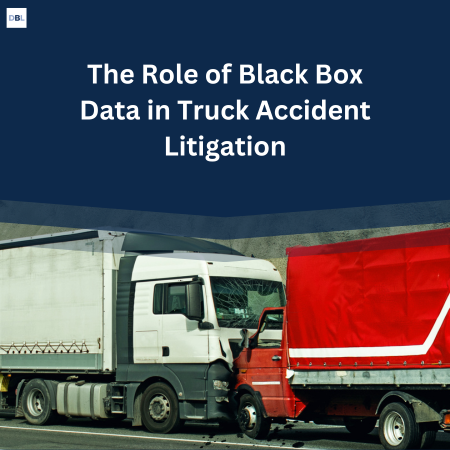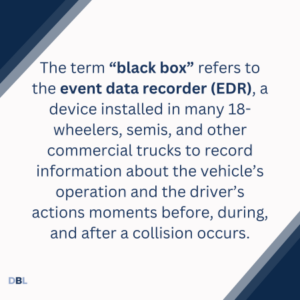
What does it mean when you hear about the details and data from a “black box” in a plane or truck crash? It refers to the event data recorder (EDR), which, for a truck, records a wealth of details about the truck’s operation just before, during, and after a collision.
For a truck accident lawyer like David Blackwell, investigations into the causes of accidents that involve tractor-trailers, semi-trucks, and other large commercial trucks are greatly helped by access to black box data.
After an accident, we at David Blackwell Law in Lancaster, South Carolina, will move promptly to secure the truck and access to its black box on behalf of an injured client. Our team can then download data as part of our investigation into the cause of the crash and our client’s truck accident claim.
If you or a loved one have suffered serious injuries in a truck accident, you deserve compensation from the party or parties who caused the accident. David Blackwell Law can investigate the crash and help you pursue the money you deserve. Contact David Blackwell Law today for a free evaluation of your legal options. Doing so promptly helps us secure evidence — including black box data — for a potential truck accident claim.
What Is a Black Box in Trucks?
 The term “black box” refers to the event data recorder (EDR), a device installed in many 18-wheelers, semis, and other commercial trucks to record information about the vehicle’s operation and the driver’s actions moments before, during, and after a collision occurs. It is part of the engine’s electronic control module (ECM) on most commercial vehicles.
The term “black box” refers to the event data recorder (EDR), a device installed in many 18-wheelers, semis, and other commercial trucks to record information about the vehicle’s operation and the driver’s actions moments before, during, and after a collision occurs. It is part of the engine’s electronic control module (ECM) on most commercial vehicles.
The ECM controls and monitors various engine functions, such as fuel injection, ignition timing, and emissions. When engine functions fail, the ECM stores error codes that help mechanics diagnose and fix problems.
The EDR component of the ECM monitors and records data about multiple functions. For example, if a reduction in wheel speed is sensed, the EDR can record almost two minutes of data about vehicle speed, brake application, clutch application, and cruise control status.
Most but not all commercial trucks have EDRs. The Federal Motor Carrier Safety Administration (FMCSA), which regulates the U.S. trucking industry, does not require EDRs on commercial trucks.
The FMCSA does require commercial trucks to install electronic logging devices (ELDs), which some people lump into what they consider a black box in commercial trucks. The ELD tracks drivers’ hours of service (HOS) behind the wheel and other information, such as:
- The duration of engine use
- When the vehicle moves
- How many miles the truck travels
Most late-model passenger vehicles have EDRs, which also can be accessed for their data after a crash.
Data recorded by a black box EDR or ELD can be downloaded later by linking the EDR or ELD with appropriate software. Accessing EDR and ELD data from a commercial truck can be crucial when investigating the cause of a truck accident and performing a comprehensive accident reconstruction.
In many cases, David Blackwell Law must ask the court to order a crashed truck’s EDR and ELD preserved and for the trucking company to allow our expert to download EDR and ELD data for our truck accident investigation. This makes it important to contact a truck accident lawyer before the crashed truck’s owners have it repaired, junked, sold, etc., and this data is gone forever.
What Kind of Data Does a Truck’s Black Box Record?
The event data recorder and electronic logging device in a commercial truck can record over 100 different types of data about the truck’s operation and the truck driver’s activity. This includes data pertaining to:
- Date and time
- Wheel speed
- Engine RPM
- Throttle position
- Gear selection
- Delta-V (a measurement of the effort required to change the direction of the truck at a specified speed)
- Anti-lock braking system status
- Yaw rate
- Roll angle
- Longitudinal acceleration
- Lateral acceleration
- Clutch status
- Service brake status
- Seat belt status
- Tire pressure
- Cruise control status
- Accelerator governor
- Cruise governor
- Audit trail
- Engine usage history
- Maintenance history
- Fault codes (engine problems identified)
- Engine parameters
- Critical event data, i.e., rapid deceleration, swerving, hard braking.
Legal Implications of Black Box Data
Data gathered from a crashed truck’s event data recorder and/or electronic logging device is generally considered admissible evidence in court proceedings pertaining to truck accident claims. It may also be used outside of court in settlement negotiations with defendants’ insurance companies.
In a truck accident claim, your attorney will work to demonstrate that the accident that injured you was caused by negligence on the part of the truck driver and/or another party responsible for the driver (i.e., their employer) or the truck’s operations. By far, most commercial truck accidents are caused by driver error.
Data from a black box in semi-trucks is solid, incontrovertible information. For example, black box data would clearly show excessive vehicle and engine speed followed by hard braking and swerving, all typical in a crash caused by speeding. If data showed no braking, no swerving, no let-up on the throttle, and no downshifting just before a crash, we would argue that the truck driver was likely drowsy, fatigued, or asleep when the accident occurred. Records of the driver’s hours on the road would also contribute to the theory that fatigue contributed to the accident.
Black box data might indicate one or more mechanical malfunctions, such as brake failure, which may have caused or contributed to the accident. This might give us reason to pursue a third-party claim against a service vendor responsible for maintaining the truck.
Data from a truck’s EDR and ELD provides an accurate and fairly measured assessment of the events leading up to the crash under scrutiny. These devices are more precise, detailed, and dependable than anything a witness to the crash can provide. In a courtroom, this data can challenge or support either side’s version of events.
Truck accidents are often complicated, with multiple parties potentially liable for losses suffered by the injured. If a truck’s black box data is intact after an accident, its contents can be crucial for understanding how the accident occurred. After a truck accident, the value of acting quickly to obtain black box data cannot be overstated.
Contact Our Truck Accident Attorneys for Help
 Were you hurt in an accident with a big rig in South Carolina? Reach out to David Blackwell Law as soon as you can so that the truck and its “black box” data are preserved as evidence for a potential legal claim.
Were you hurt in an accident with a big rig in South Carolina? Reach out to David Blackwell Law as soon as you can so that the truck and its “black box” data are preserved as evidence for a potential legal claim.
David Blackwell, a reputable and experienced Lancaster truck accident lawyer, can move promptly to gain access to black box data, thoroughly investigate the accident you were in, identify parties at fault, calculate your losses, and work to secure full and fair compensation to you. Plus, you pay nothing upfront while David builds a compelling case for you. Instead, he works on a contingency fee basis, meaning you pay nothing unless he obtains a settlement or courtroom verdict in your favor.
Contact David Blackwell Law for a free, no-obligation legal consultation today.
